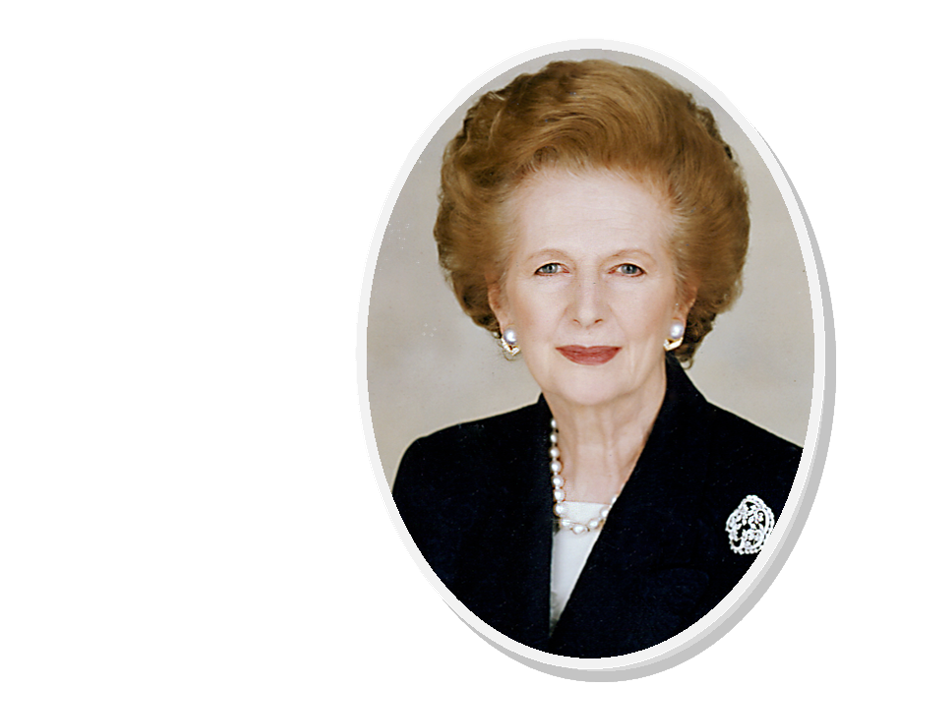Margaret Thatcher
(1925-2013)
…Hayek’s writings have not dated with the years. They remain a star by which the governments of
free nations everywhere would be well advised to steer their course.
Margaret Thatcher
Take Away
As conservative Prime Minister, Margaret Thatcher (October 13, 1925 – April 8, 2013) shaped the politics of the United Kingdom from 1979 to 1990. She was the first woman to hold this office and, at almost twelve years in office, the longest-serving Prime Minister of the 20th century. Before entering politics, Thatcher worked as a research chemist and later as a lawyer. From 1970 to 1974, she served as Secretary of State for Education. In 1975, she was surprisingly elected leader of the Conservative Party after challenging then Prime Minister Edward Heath. Inspired by F.A. von Hayek’s work, she implemented a series of hard-fought but successful free-market reforms that became known as “Thatcherism”. These measures included a rigorous privatization of underperforming state-owned enterprises, the reduction of trade union power and tax cuts. After her support within her own party dwindled, she resigned in 1990 and was replaced by her rather weak successor John Major. She died 2013, in London at the age of 87.
Inspired by Hayek
Soon after “Maggie” Thatcher was elected leader of the British Conservative Party in 1975, she impatiently interrupted the previous speaker in an important political strategy meeting, smashed F.A. von Hayek’s book The Constitution of Liberty (1960) on the table and in no uncertain words made it clear to the party leadership that this work was her economic and socio-political credo. Perhaps she was thinking in particular of the last
chapter of this work, which Hayek entitled “Why I am not a Conservative”.
Although F.A. von Hayek (1899-1992, Nobel Prize 1974) was never officially Thatcher’s adviser, the influence of his thinking is difficult to miss. After all, Margaret Thatcher as a young chemistry student at Oxford was already devouring Hayek’s famous book The Road to Serfdom (1944), a bestseller during the years following WWII. But Milton Friedman (1912-2016, Nobel Prize 1976), who also never served as her advisor, should not go unmentioned here. His handwriting can hardly be overlooked, especially in Thatcher’s monetary policy. Especially Hayek’s and to a lesser extend Friedman’s ideas and influence are clearly summarized in an interesting pamphlet The Right Approach to the Economy (London, 1977).
Overregulation
The clear failure of the overregulated British economy, the nationalization of the most important industries, including supply and transport corporations, but also the careless expansion of the unaffordable “National Health Services” (NHS) had made England the ‘sick man of Europe’ during the 1970s. Although the standard of living of large parts of the English population improved statistically during this time, the alleged prosperity ended in the so-called English Disease, which soon became synonymous with overpowering trade unions, the decline in economic efficiency and competitiveness, and most importantly with the corrupting welfare state.
When Thatcher became England’s first female Prime Minister in 1979, she faced the most haunting and challenging task of turning the socially and economically rapidly declining country with inflation rates reaching 20% and an astronomical national debt into a modern society, based on free markets, limited government, a robust civil society and the rule of law. Thatcher surprised England with a radical yet full of empathy cure of a firm austerity policy, which she could swiftly implement due to her majority in parliament. Thatcher’s consistent reform policy brought the vaguely discussed welfare state consensus of the Labor Party, Conservatives and Liberals to a grinding and sudden halt. Her political approach soon was branded Thatcherism and did not only refer to her politics, but also to her combative personal style, her ethical outlook or strong regard for the interests of the individual. Although condescendingly condemned by Keynesians of all stripes in most or Western Europe, her successful policy approach was often copied in Eastern Europe.
Violent protests
Due to Thatcher’s shock therapy suddenly there was neither room for subsidies for state-owned companies nor for regulatory state interventions into the socio-economic fabric of society. The standard of applied social policy was no longer tied to the desire for financial state benefits of all kinds, rather to budgetary restraints. For Thatcher, unemployment was no longer presumed as a public social problem, but as an individual fate, and the responsibility for looking for work was primarily transferred back to those affected. In other words, Thatcher’s credo was that only free markets, limited government, a robust civil society and the Rule of Law could modernize the economy and society. Her aim was to free the British economy from outdated and uncompetitive structures, to promote entrepreneurship and to make people less dependent of public transfer payments. In almost all areas, attempts were made to consistently push back the influence of the state. In tough political struggles, Thatcher gradually succeeded in introducing some comprehensive legislation and began to drastically pushing back the power and the undemocratic privileges of the large and influential trade unions. In the early years of her government, the trade unions reacted to these measures with sometimes bitter strikes, which often escalated into violent riots.
Although capital slowly began to flow back to England due to the abolition of exchange controls and tax cuts, the unemployment rate increased dramatically, putting Thatcher under great political pressure even within her own party. However, when asked to quickly reverse her approach and make a U-turn, she famously responded with her battle cry “the Lady’s not for turning!” Despite angry protests, an unemployment rate of almost 12% and a serious political opposition during her first term, Thatcher stayed her course and managed to control inflation and to reduce the astronomical government spending. After years of double-digit inflation rates, her steely budget discipline and some tools provided by Milton Friedman’s monetarism succeeded in bringing inflation down to below 5% by 1983.
In April 1982, Thatcher responded to Argentina’s unprovoked invasion of the Falkland Islands with a harsh military ultimatum. Only a few days after Argentina did not meet her conditions, she mobilized the Royal Navy and launched a fleet of over 100 ships. The war ended in June 1982 with Argentina’s surrender.
Iron Lady
A year later, as the British economy began to visibly recover, Thatcher meanwhile nicknamed by the Soviet leadership as ‘Iron Lady’ was re- lected in an unprecedented landslide victory. Equipped with a comfortable parliamentary majority, she began to realize her compassionate vision of “people’s capitalism”. In a first step Thatcher forced the comprehensive privatization of unprofitable state-owned companies and encouraged especially their employees to acquire shares of these companies. But not only politically almost untouchable giants such as National Freight, British Coal, British Telecom, British Gas or British Airways were successfully auctioned off. The sale of well over a million state-owned apartment buildings and apartments to their tenants at reduced prices also effectively promoted the acquisition of real estate on a large scale.
However, when Thatcher announced the closure of several hopelessly outdated and loss-making coal mines and the elimination of some 20,000 jobs, she was met with fierce and often violent opposition from nearly 1 million unionized and militant miners. Led by its President, the Marxist Arthur Scargill, the National Union of Mineworkers (NUM) emerged as a political spearhead in nationwide demonstrations against Thatcher’s austerity policies. This led to a vicious and relentless strike aimed at Thatcher’s government in March 1984. Some ugly scenes and arguments then used in South Yorkshire are strikingly similar to the situation in today’s France. At stake was a politically fundamental issue, because the discourse was about the exclusive right of the owner to control and run an industry responsibly and about the indiscriminate power of trade unions to intervene. The political defeat of the miners after a 362-day strike was both, the climax and the end of the politically motivated protest by the English trade union organizations against her vision of a free market economy.
Baroness Thatcher
Despite Thatcher’s reputation as being inflexible and unyielding, starting from the mid- 1980s in the face of massive opposition she revised some of her further denationalization plans. Not only did she reverse her intention to privatize the unaffordable yet hugely popular National Health Service (NHS) or the public water supply. Also student loans and subsidies for individual pension insurance planes were again guaranteed by the state.
Even though many political polls suggested that her government was doomed, Thatcher won the elections for the third time in June 1987. She tried to use this political capital, unique in the history of Great Britain, to introduce more competition in the various systems of public education and the NHS, however with mixed success.
The so-called Lawson Boom (named after her Treasury Secretary Nigel Lawson), triggered tax and credit breaks, led to budget surpluses and brought the unemployment rate down to about 7%. However, the stock market crash of October 1987 and internal conflicts over Britain’s future political role within the EU marred some of these achievements. Unlike Lawson, Thatcher was convinced that pegging the British pound to other European currencies would mean the loss of Britain’s independence.
It was especially her ill-fated attempt to enforce her idea of a personal kind of poll tax to replace the income tax that even her electorate felt to be unreasonable, which initially led to a great personal loss of popularity. A short time later there were violent demonstrations in Scotland and the resignation of Nigel Lawson, followed by a number of her economic advisers. After internal party votes were held in her absence, Thatcher felt deeply humiliated and resigned in late November 1990. After retiring from the Commons in 1992, H.M. Queen Elizabeth II awarded her a life peerage as Baroness Thatcher (of Kesteven in the County of Lincolnshire) which entitled her to sit in the House of Lords. Despite a number of economic and also personal setbacks, the majority of her government’s economic policy goals had been achieved by the end of her term in 1990. The unemployment rate had fallen to around 6.5%, and the 4% inflation rate was the envy of many countries. Due to the privatization proceeds and especially due to the huge tax revenue from England’s North Sea oil production, Great Britain’s state budgets were not only balanced until the end of the 1980s. Even in some years surpluses were achieved, which were used to decrease the high government debt burden. On April 8, 2013 the “Iron Lady” died in London at the age of 87.
































